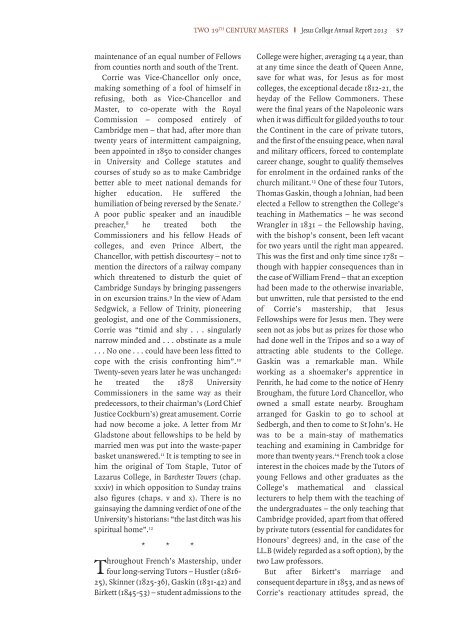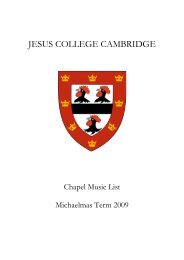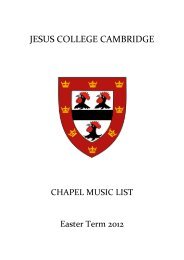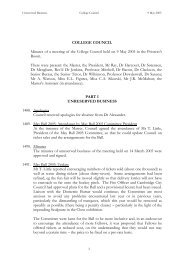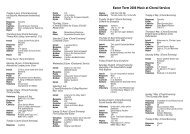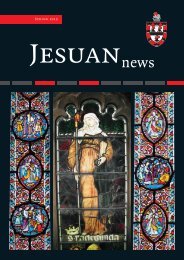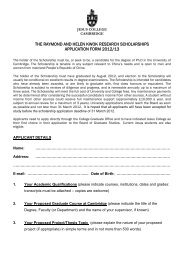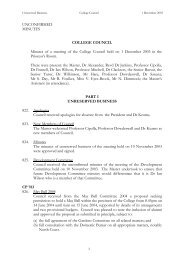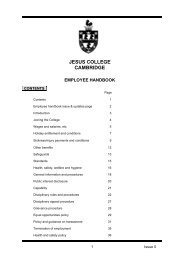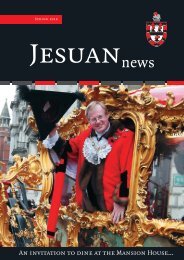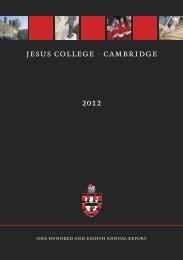2013 Annual Report - Jesus College - University of Cambridge
2013 Annual Report - Jesus College - University of Cambridge
2013 Annual Report - Jesus College - University of Cambridge
You also want an ePaper? Increase the reach of your titles
YUMPU automatically turns print PDFs into web optimized ePapers that Google loves.
TWO 19 TH CENTURY MASTERS I <strong>Jesus</strong> <strong>College</strong> <strong>Annual</strong> <strong>Report</strong> <strong>2013</strong> 57<br />
maintenance <strong>of</strong> an equal number <strong>of</strong> Fellows<br />
from counties north and south <strong>of</strong> the Trent.<br />
Corrie was Vice-Chancellor only once,<br />
making something <strong>of</strong> a fool <strong>of</strong> himself in<br />
refusing, both as Vice-Chancellor and<br />
Master, to co-operate with the Royal<br />
Commission – composed entirely <strong>of</strong><br />
<strong>Cambridge</strong> men – that had, after more than<br />
twenty years <strong>of</strong> intermittent campaigning,<br />
been appointed in 1850 to consider changes<br />
in <strong>University</strong> and <strong>College</strong> statutes and<br />
courses <strong>of</strong> study so as to make <strong>Cambridge</strong><br />
better able to meet national demands for<br />
higher education. He suffered the<br />
humiliation <strong>of</strong> being reversed by the Senate. 7<br />
A poor public speaker and an inaudible<br />
preacher, 8 he treated both the<br />
Commissioners and his fellow Heads <strong>of</strong><br />
colleges, and even Prince Albert, the<br />
Chancellor, with pettish discourtesy – not to<br />
mention the directors <strong>of</strong> a railway company<br />
which threatened to disturb the quiet <strong>of</strong><br />
<strong>Cambridge</strong> Sundays by bringing passengers<br />
in on excursion trains. 9 In the view <strong>of</strong> Adam<br />
Sedgwick, a Fellow <strong>of</strong> Trinity, pioneering<br />
geologist, and one <strong>of</strong> the Commissioners,<br />
Corrie was “timid and shy . . . singularly<br />
narrow minded and . . . obstinate as a mule<br />
. . . No one . . . could have been less fitted to<br />
cope with the crisis confronting him”. 10<br />
Twenty-seven years later he was unchanged:<br />
he treated the 1878 <strong>University</strong><br />
Commissioners in the same way as their<br />
predecessors, to their chairman’s (Lord Chief<br />
Justice Cockburn’s) great amusement. Corrie<br />
had now become a joke. A letter from Mr<br />
Gladstone about fellowships to be held by<br />
married men was put into the waste-paper<br />
basket unanswered. 11 It is tempting to see in<br />
him the original <strong>of</strong> Tom Staple, Tutor <strong>of</strong><br />
Lazarus <strong>College</strong>, in Barchester Towers (chap.<br />
xxxiv) in which opposition to Sunday trains<br />
also figures (chaps. v and x). There is no<br />
gainsaying the damning verdict <strong>of</strong> one <strong>of</strong> the<br />
<strong>University</strong>’s historians: “the last ditch was his<br />
spiritual home”. 12<br />
* * *<br />
Throughout French’s Mastership, under<br />
four long-serving Tutors – Hustler (1816-<br />
25), Skinner (1825-36), Gaskin (1831-42) and<br />
Birkett (1845-53) – student admissions to the<br />
<strong>College</strong> were higher, averaging 14 a year, than<br />
at any time since the death <strong>of</strong> Queen Anne,<br />
save for what was, for <strong>Jesus</strong> as for most<br />
colleges, the exceptional decade 1812-21, the<br />
heyday <strong>of</strong> the Fellow Commoners. These<br />
were the final years <strong>of</strong> the Napoleonic wars<br />
when it was difficult for gilded youths to tour<br />
the Continent in the care <strong>of</strong> private tutors,<br />
and the first <strong>of</strong> the ensuing peace, when naval<br />
and military <strong>of</strong>ficers, forced to contemplate<br />
career change, sought to qualify themselves<br />
for enrolment in the ordained ranks <strong>of</strong> the<br />
church militant. 13 One <strong>of</strong> these four Tutors,<br />
Thomas Gaskin, though a Johnian, had been<br />
elected a Fellow to strengthen the <strong>College</strong>’s<br />
teaching in Mathematics – he was second<br />
Wrangler in 1831 – the Fellowship having,<br />
with the bishop’s consent, been left vacant<br />
for two years until the right man appeared.<br />
This was the first and only time since 1781 –<br />
though with happier consequences than in<br />
the case <strong>of</strong> William Frend – that an exception<br />
had been made to the otherwise invariable,<br />
but unwritten, rule that persisted to the end<br />
<strong>of</strong> Corrie’s mastership, that <strong>Jesus</strong><br />
Fellowships were for <strong>Jesus</strong> men. They were<br />
seen not as jobs but as prizes for those who<br />
had done well in the Tripos and so a way <strong>of</strong><br />
attracting able students to the <strong>College</strong>.<br />
Gaskin was a remarkable man. While<br />
working as a shoemaker’s apprentice in<br />
Penrith, he had come to the notice <strong>of</strong> Henry<br />
Brougham, the future Lord Chancellor, who<br />
owned a small estate nearby. Brougham<br />
arranged for Gaskin to go to school at<br />
Sedbergh, and then to come to St John’s. He<br />
was to be a main-stay <strong>of</strong> mathematics<br />
teaching and examining in <strong>Cambridge</strong> for<br />
more than twenty years. 14 French took a close<br />
interest in the choices made by the Tutors <strong>of</strong><br />
young Fellows and other graduates as the<br />
<strong>College</strong>’s mathematical and classical<br />
lecturers to help them with the teaching <strong>of</strong><br />
the undergraduates – the only teaching that<br />
<strong>Cambridge</strong> provided, apart from that <strong>of</strong>fered<br />
by private tutors (essential for candidates for<br />
Honours’ degrees) and, in the case <strong>of</strong> the<br />
LL.B (widely regarded as a s<strong>of</strong>t option), by the<br />
two Law pr<strong>of</strong>essors.<br />
But after Birkett’s marriage and<br />
consequent departure in 1853, and as news <strong>of</strong><br />
Corrie’s reactionary attitudes spread, the


